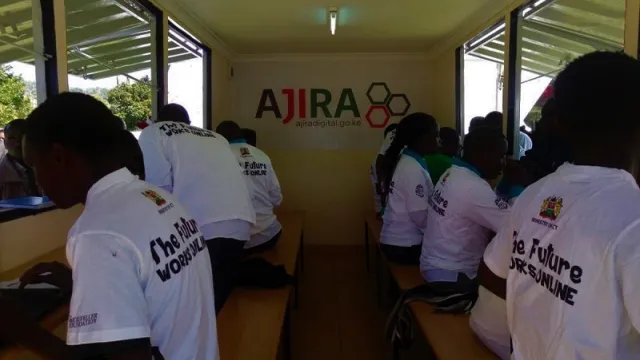Where Kenyan youth hone tech skills, work in global digital market

Where Kenyan youth hone tech skills, work in global digital market
When Kenya shed over two million jobs during the Covid-19 pandemic amid meltdown across the industries, analysts arrived at one sobering reality: The economy is in the tank.
A significant percentage of the country’s workforce – principally the youth – who were earning their living in food services, restaurant and beverage businesses, hospitality, manufacturing, tourism, education among other sectors just vanished. This begs the question, where are they now?
Read also: Kenyans turn to casual labour amid COVID-19 pandemic
With the end of the Covid-19 pandemic out of sight, returning to gainful employment looks bleak if not hopeless for a majority of Kenya’s youth, who make up about 80 per cent of the unemployed population.
As the number of job opportunities continue to stagnate, learning a new set of skills could reset the youth on a path to productive engagement, new work opportunities or even entrepreneurship.
As the pandemic razes the world, the importance of a robust digital economy, complete with reliable broadband services is becoming essential. Kenya has been on course for some time now.
Take Ajira Digital Programme for instance. Launched in 2017, Ajira Digital Programme seeks to train and facilitate millions of Kenyan youth in finding jobs either as freelancers, startups, or contractors by simply harnessing the internet.
Going digital is now more critical than ever with the Covid-19 disease fast shifting how we live, work and interact with people across the world.
Equally, businesses that need help with services such as copywriting, e-marketing, graphic design, programming or other specialized services can easily find the perfect service provider online.
Ajira Digital Program is a government project by the Ministry of ICT, Innovation and Youth Affairs that aims at enabling a million Kenyan youth to make money online. The ministry has tapped technology training firm, eMobilis, as the principal partner to help run Ajira Youth Empowerment Centers in Kenya.
The latest data from the Communications Authority (CA) shows that at the end of the first quarter of 2020/21 financial year, the Internet/data market recorded growth with rising dependence on digital platforms for work, learning, healthcare, shopping and entertainment.
It is by riding on such digital platforms that Ajira project seeks to position Kenya as a choice of labour for international companies as well as encourage local companies and the public sector to create digital work.
The total data/Internet subscriptions rose by 4.8 per cent to 43.5 million, from 41.5 million subscriptions reported last quarter with mobile data subscriptions representing about 98.5 per cent of the total subscriptions, says the CA industry report.
A recent report from the World Bank notes that Kenya has the highest rate of youth joblessness in East Africa with 17 per cent of all young people eligible for work lacking jobs.
In its pilot phase in 2017, the Ajira Digital Programme managed to train 7,168 youth out of a target of 8,000 by equipping them with the necessary skills to start bidding and doing online jobs, said eMobilis co-founder Ken Mwenda.
Hottensiah Njoroge is one of the 1,984 females who are benefited from the initial Ajira mentorship drive. Before joining the programme, Hottensiah worked in public relations doing voiceovers for clients.
"I gained new skills and knowledge about the online work which I am passionate about," she told Maudhui House, adding that she plans to open a virtual shop that will specialize in offering digital marketing and public relations services.
Armed with the right skills and knowledge, the beneficiaries have encouraging stories to share as they have been successfully bidding and executing jobs. Hotensiah says Ajira training has seen her focus on her passion - digital marketing. She’s positive that she'll help other businesses increase their sales through the skills learnt.
Data from eMobilis shows that of the 67 per cent who started bidding for online work, 49 per cent got offers. Their earnings ranged between $10 and $320 while their cumulative pay from different online work platforms during the one-month mentorship was over $100,000.
Other opportunities have also come calling for the project beneficiaries. Sample this: Early last year, the Ministry of ICT posted 230 interns from the Ajira programme to work in county information offices countrywide where they’ll help steer the program by providing technical support services.
With novel coronavirus disrupting face to face training, the Ajira programme has turned to Zoom where mentees sharpen their skills how to start and run their businesses virtually.
The Ajira programme is funded by The Mastercard Foundation with the Kenya Private Sector Alliance (KEPSA) and eMobilis as the implementing partners.



